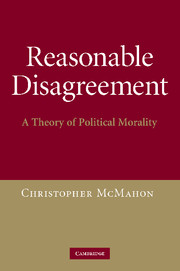1 - The structure of reasonable disagreement
Published online by Cambridge University Press: 11 September 2009
Summary
In this initial chapter I consider the characteristic features of reasonable disagreement. I have said that one of the marks of reasonable disagreement is that shared deliberation about what is justified by a given body of evidence, or set of reasons, does not produce convergence on a single answer, no matter how openly it is conducted or for how long. As I have indicated, my primary concern is reasonable disagreement in politics, disagreement concerning how political cooperation is to be organized. The focus of the book is normative and evaluative disagreement as it pertains to the organization of political cooperation. But decisions about how to organize political cooperation often turn on the answers to questions of empirical fact. So after an initial section explaining why the phenomenon of reasonable disagreement is puzzling, I briefly consider whether questions of empirical fact admit of reasonable disagreement. This topic is of interest in its own right, and discussing it will help us to see, in the fourth section, what is distinctive about reasonable normative and evaluative disagreement. The chapter concludes with some material on meta-ethics that sets the stage for chapter 2.
THE PROBLEM
It is difficult, in providing an account of reasonable disagreement in politics, to keep both aspects of the phenomenon firmly in view. Disagreement in politics concerns how political cooperation ought to be organized. It is disagreement concerning the actions that are to be taken collectively by the members of a polity.
- Type
- Chapter
- Information
- Reasonable DisagreementA Theory of Political Morality, pp. 7 - 33Publisher: Cambridge University PressPrint publication year: 2009



